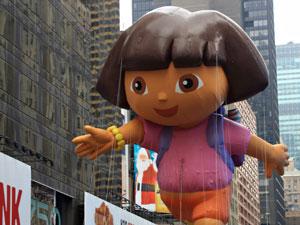The fraught politics of kid’s TV
(Image by Flickr user all of olive (cc:by-nc))
This story was originally covered by PRI’s The World. For more, listen to the audio above.
Dora the Explorer is an unlikely political figure. The cherubic cartoon girl with impossibly large eyes inhabits a world devoid of politics, where innocence and adventure reign. Much of Dora’s life is spent chasing rainbows, but her unspecified Hispanic origin, and the few words of Spanish that she peppers into her speech, have dragged her directly into the heated battle over immigration in the United States.
A photoshopped mug shot recently surfaced on the internet of Dora sporting a black eye and holding a sign that accused her of “Illegal Border Crossing / Resisting Arrest.”
There are now parody videos, in both English and Spanish, exploring Dora’s status as an illegal immigrant. A Facebook group called “Dora the Explorer is soo an Illegal Immigrant…” garnered 59,900 fans and was covered by MSNBC, the BBC, and other websites. Children’s television expert Lynne McVeigh told PRI’s The World, “To do this to this character with this kind of an image is saying in a way the ridiculousness of this type of prejudice.”
The parodies may be funny, but they’re unfair to children, according to an editorial in the Daily Courier. “The problem now is we’re bringing children into the discussion, and a skewed discussion at that,” the editorial reads. Adults may understand the joke, but children, who are being used as pawns in the debate, may not.
Children’s shows, of course, have long been drawn into political spitting matches. In 1999, Reverend Jerry Falwell spoke out against the Teletubbies, saying that the character Tinky Winky is gay. And politically charged children’s books, from “Help! Mom! There Are Liberals Under My Bed” to “Why Mommy Is a Democrat” have been around for years.
Of course, not every bilingual character becomes as politicized as Dora. The World’s Alex Gallafent points out that Kai-lan, an animated preschooler who teaches children Chinese, has escaped many of the parodic indignities that Dora has been subjected to. “If Kai-lan is the Chinese Dora, she has an easier road,” according to Gallefent, “Chinese immigration is hardly the hot button issue that immigration from Hispanic countries is.”
The people behind many children’s TV characters would often rather stay out of the charged political debates. The creators of Sesame Street, a pioneer in incorporating diversity into American kid’s television, don’t go out seeking multi-cultural characters, according to executive producer Carol-Lynn Parente. She told The World:
We didn’t set out to create a character that spoke Spanish. We happened to cast a wonderful puppeteer in Carmen Osbahr who is just a Mexican American. And so she is bilingual and we worked that into her character.
If Sesame Street ends up being multi-cultural, that’s simply a product of the fact that children are living in a more diverse world. According to Parente, “You know we really try at Sesame Street to prepare them for what they’re going to encounter in life.”
PRI’s “The World” is a one-hour, weekday radio news magazine offering a mix of news, features, interviews, and music from around the globe. “The World” is a co-production of the BBC World Service, PRI and WGBH Boston. More “The World.”
